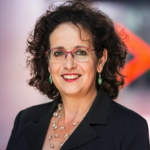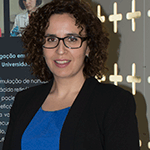FIRST IBERIAN MEETING
ON EXTRACELLULAR VESICLES
30 SEPTEMBER 2015 | PORTO | PORTUGAL
INVITED SPEAKERS
 |
Marca Wauben
Marca Wauben heads the research group Intercellular Communication of the Department of Biochemistry & Cell Biology, Faculty of Veterinary Medicine of Utrecht University.
|
|
| She studied Biology at Utrecht University and performed her graduate research at the Department of Infectious Diseases & Immunology of the Faculty of Veterinary Medicine (PhD cum laude, 1993). Postdoctoral training was performed at Utrecht University and at the University of California San Diego, USA. She became fellow of the Royal Academy of Arts and Sciences of the Netherlands and established her own research groups at Utrecht University, Department of Infectious Diseases & Immunology, at Leiden University Medical Center, Department of Immunohematology and Blood Transfusion and at Utrecht University, Department of Biochemistry & Cell Biology, Faculty of Veterinary Medicine. In 2011 she became full professor Intercellular Communication. Her research group investigates the role of cell-derived vesicles (EVs) in intercellular communication in several biological systems with emphasis on the immune system. For (functional) characterization of EVs they developed specialized high resolution flow cytometry-based technology which enables individual EV-based analysis. Marca Wauben is Executive Chair Science of the International Society for Extracellular Vesicles (ISEV) and vice-chair of the EU COST Action BM1202 Microvesicles and Exosomes in Health and Disease (2012). She is one of the leaders of the new focus area of the Utrecht University; Future Food Utrecht. Specialty: Extracellular vesicles, intercellular communication, immunology |
||
 |
Sónia Melo
Sonia Melo is Principal Investigator at IPATIMUP/I3S. She graduated in Biochemistry at Faculty of Sciences, Porto (2005) and developed her PhD as part of the GABBA PhD Program at the Spanish National Institute of Health (CNIO) and Institut d'Investigació Biomèdica de Bellvitge, under the supervision of Manel Esteller (2010).
|
|
| She performed a four years postdoctoral training at Harvard Medical School (Boston, USA) and MD Anderson Cancer Center (Houston, USA) before moving to IPATIMUP, Portugal (2014). Sonia was awarded the 2014 L'Oreal award for women in Science. Sonia Melo is an expert on microRNAs and exosomes biology in cancer. She reported for the first time the presence of genomic DNA in exosomes and described for the first time a cell independent function of exosomes, to synthetize microRNAs. Sonia’s current research goals are the crosstalk between tumor cells mediated by exosomes and how these events lead to the overall dynamics of a tumor. |
||
 |
Hernando A del Portillo
|
|
| Hernando del Portillo studied parasite biology at the University of Georgia where he received a PhD in 1985 followed by two postdoctoral trainings at the New York University Medical Center and the Institut Pasteur where he specialized in molecular biology of malaria parasites. Hernando del Portillo have pursued these molecular studies to unveil the mechanisms of virulence and to develop rational control strategies. Cornerstones of this research activity are: (1) the discovery of a subtelomeric multigene variant family in Plasmodium vivax malaria proposed to be involved in spleen-immune evasion and (2) the discovery that reticulocyte-derived exosomes (rex) from infections could be used as a new platform and vaccine against malaria. He joined CRESIB as an ICREA Research Professor in 2007 with the specific objective of unveiling the molecular basis of this spleen immune evasion mechanism and to develop a rex-vaccine against this human malaria parasite. To this latter end, he co-founded a new Spin-off: INNOVEX THERAPEUTICS S.L. | ||
Rua do Campo Alegre, 823, 4150-180 Porto - Portugal
Tel +351 226 074 900 . Email: RITA.MATOS@ibmc.up.pt